Ruben y Rick cross over in different directions
Los Super Seven combined members of Los Lobos and Texas Tornados with Austin singers Ramos, Trevino and Ely
Bands are discovered at SXSW, not put together. But Los Super Seven grew out of a guitar pull in the back patio at Las Manitas restaurant on Congress Avenue in March 1997, recorded an LP on RCA in ‘98, then won the best Mexican-American album Grammy in 1999.
The original Seven were David Hidalgo and Cesar Rosas from Los Lobos, Freddy Fender and Flaco Jimenez from Texas Tornados, Tejano singer Ruben Ramos, country star Rick Trevino and token guero Joe Ely. Two more Los Super Seven LPs came out- Canto in 2001 and Heard It On the X in 2005- but Austin singers Ramos and Trevino are the only ones on all three albums.
Buena Vista Social Club sold a million copies of traditional Cuban music in ‘97, which drew RCA’s interest in this East-L.A.-meets-South-Texas project. But the impetus was Trevino’s manager Dan Goodman trying to bust his client out of the cheesy Nashville hat pack. He teamed with former MCA head of publicity Paula Batson to host a daytime showcase putting Trevino with Doug Sahm, Rosie Flores, Augie Meyers, and the Lobos guys. The kid held his own with those legends.
“(Trevino) has more vocal chops than 98% of the people in country music,” said Super Seven consultant Rick Clark. “But he was thought of as kind of a lightweight. Dan’s idea was to transition Rick to artistic adulthood by embracing his lineage.”
Since the party was “press only” and the best Mexican restaurant in town was catering, you can bet every scribe with a badge was there. Well, every unashamed freeloader but one. I had to hear about how great that first bordertown songfest was from everybody else. The big celebrity that year (SXSW had only one per back then) was actress Clare Danes and so I was waiting in line for her Australian singer boyfriend Ben Lee, so I could write a couple lines about Ms. Danes for my gossip column. As “the party of the decade” was rollicking six blocks away, Clare was a no-show at Lee’s. Welcome to my so-called life.
The Goodman/Batson soiree was the hot invite for several more SXSWs, until the Perez sisters closed up Las Manitas in 2007 to make way for the Marriott. The 2004 party, to mark the release of the Alejandro Escovedo benefit/tribute LP Por Vida was pretty special, featuring Los Lonely Boys at their “Heaven”-ly peak. John Cale and surprise show-stealer Bobby Neuwirth were also there for the guest of honor, who was too frail to play. That was the year every rock critic learned how to spell “Hepatitus.”
The second year added Ruben Ramos, who Clark called “the soul of Los Super Seven.” Though his Texas Revolution band rode a rough patch in the ‘80s, when the horn-driven orquesta style (Ides of March’s “Vehicle” with hydraulics) was replaced in popularity by young Tejano bands using synthesizers, Ramos was on a career upswing in the ‘90s. “The brass sound is in my soul,” the singer told Cathy Ragland of the Statesman in ‘96. He’d signed with Virgin that year and released a pair of well-received albums- El Chupa Chavaz and El Gato Negro Smooth- in quick succession. The “El Gato Negro” nickname came with a cool look- sunglasses and black and white clothing. Ruben Ramos was the smoothest.
When he walked into Cedar Creek studio in South Austin in the spring of ‘98, the sessions for Los Super Seven got a lot more authentic. “If anyone had the right to act like a prima donna it was Ruben,” said Clark. “Everybody was in awe of him, but he was so humble. He was as honored to be a part of Los Super Seven as we were to have him.”
Born in Sugarland in 1940, Ramos grew up in Utley, 30 miles east of Austin. Mother Elvira (Perez) played guitar and father Alfonso Sr. played fiddle and picked cotton. Ten of their brothers were musicians, as were Ruben’s six brothers and sister Inez.
After returning from WWII, Elvira’s brother formed Justin Perez and the Ex-G.I.’s, a popular dance band where the generations merged. Alfonso Ramos Jr. sang for that group before moving on to the Nash Hernandez Orchestra, and then the Ramos- Guerrero Band with Louie Guererro.
“In the early ‘50s we were playing nothing but Spanish music,” Alfonso Jr. told the Statesman in 1988. “Around 1956, Fats Domino started coming out with ‘Blue Monday’ and ‘Blueberry Hill,’ and we started playing some of that stuff. With rock ‘n’ roll everything started to change.”
Austin’s Manuel “Cowboy” Donley is credited (and blamed) for taking Tejano electric with his six-piece Las Estrellas in 1955, transforming traditional acoustic Mexican music in the same way honky tonk did Western swing. “They called me a monster,” Donley told musica tejana scholar Evaliza Fuentes in 2018. But Las Estrellas would always win the Sunday “Mexican Night” battles at the Skyline with Donley’s electric guitar leading the way.
Tejano became an amalgam of all styles of popular music because, as Alfonso Jr. said, “so many people who used to listen to just Spanish music are bilingual now.”
When Alfonso Jr. fronted his own orchestra in the early ‘60s, younger brothers Ruben played drums, and Roy was on bass. Those two left in 1969 to start the Mexican Revolution, a dance hall band named in alignment with the Chicano rights movement. Ruben was a singing drummer for a couple years, but he had such an impassioned tenor and great presence, bandleader Roy (who everyone called “Pia”) moved him front and center. Ruben was becoming a star on the Tejano circuit, but his job as computer programmer for the state board of insurance limited touring. Finally, in 1973, Ramos shirked the numbing security of his day job to go fulltime with music, a good decision, it turned out.
The band changed its name to Texas Revolution in 1981, with Alfonso Jr. joining as co-vocalist, a setup also used, and discarded, by Little Joe y Johnny y la Familia, the Revolution’s rivals from Temple. In the 2000s the band was back to being Ruben Ramos and Mexican Revolution, winning a Grammy for best Tejano album in 2009.
To play the Tejano circuit is to perform exclusively in the Mexican-American world. You’re invisible to everyone else. Los Super Seven would be the first time Ramos, still performing today at age 82, sang for mixed Anglo and Latino audiences.
The same went for Trevino, the Round Rock native who didn’t speak any Spanish until Goodman sent him to live in Guadalajara for six months before Los Super Seven. Trevino’s records on Columbia Nashville sold almost exclusively to fans of mainstream country.
When the label signed him in 1992, they wanted him to cross over to the Latin market by singing in Spanish, but Trevino was against the idea because he thought he might come off as a Tejano singer going country instead of the other way around. "I'm proud of my heritage, but I lived in a mostly Anglo environment,” Trevino told me in ‘94. “I was just one of the guys." Trevino said he would be embarassed when his parents picked him up in front of his friends blaring Mexican music. Having to be taught the lyrics phonetically, Trevino recorded his first album Dos Mundo (Two Worlds) under protest.
A classically trained pianist, Trevino switched to pop music at his junior high where his band True Illusion played high school dances. The group's highlight was when they opened for Gloria Estefan and the Miami Sound Machine in Austin.
Like Garth Brooks, Ricky was turned on to country music by George Strait. Most of Strait's Ace In the Hole Band lived in Austin and, impressed by Ricky’s singing, took him under their wing. His grandfather kept asking if he’d learned his favorite song, “San Antonio Rose,” yet. But the old man died before Trevino could sing it to him, so he wrote “San Antonio Rose To You” - a big step in his songwriting.
Even with the Strait connection, luck played the biggest part in Trevino getting signed to a major label as a 21-year-old Texas A&M student. Columbia A&R rep Paul Jarosik was vacationing on Lake Travis in late ‘91 when dinner plans in Austin were washed out by flooded roads. He had to eat at a joint near the lake called the Thirsty Turtle. There he saw numerous clippings on the wall about a new local sensation named Ricky Trevino, who sang everything from Hank Williams to Elton John at the Turtle on weekends. Jarosik showed his business card and got a number.
"Paul called me up and asked for a demo,” Trevino recalled. “When I sent them something, (Dolly Parton’s producer) Steve Buckingham called back and said he was going to sign me." After the moderately successful Dos Mundos marketing ploy, Trevino landed five tracks on the Billboard Top 5 country singles chart from ‘94-’97, including the #1 singles “Running Out of Reasons to Run” and “Learning As You Go.” The single most often played today on country oldies stations is “Bobbie Mason.”
Looking like he stepped out of a rodeo sketch on Donny & Marie didn’t hurt record sales, but it made it hard to take Trevino too seriously. But he grew up fast with Los Super Seven, and recorded the best album of his career with 2001’s Mi Son on the Vanguard label. No one had to teach Ricardo Trevino Jr. how to pronounce the lyrics this time.
He hasn’t had a Nashville hit since he inspired the formation of Los Super Seven in 1997, but Trevino still plays the old hits in concert, then mixes in some songs in Spanish about the plight of migrant workers or lovers separated by borders real or imagined. As the ‘90s ended, the Williamson County kid was truly becoming an artist of two worlds.

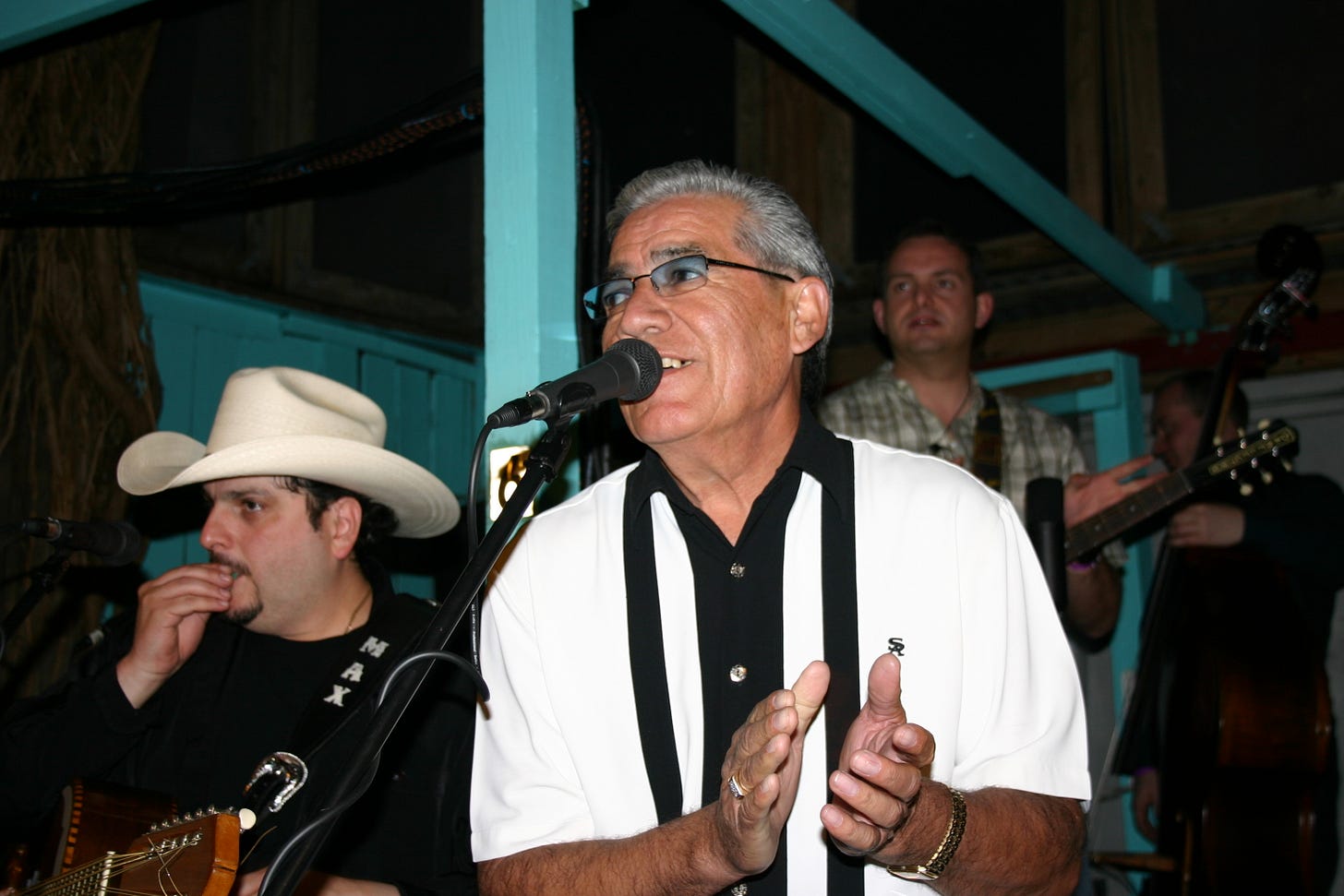
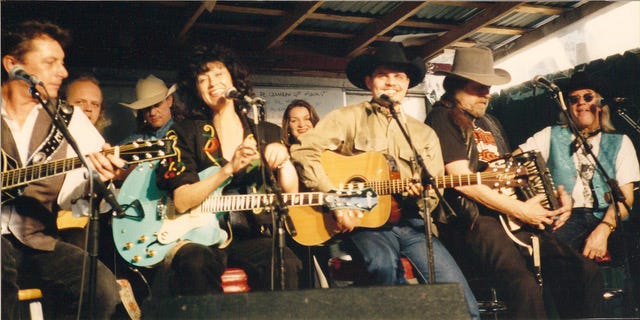
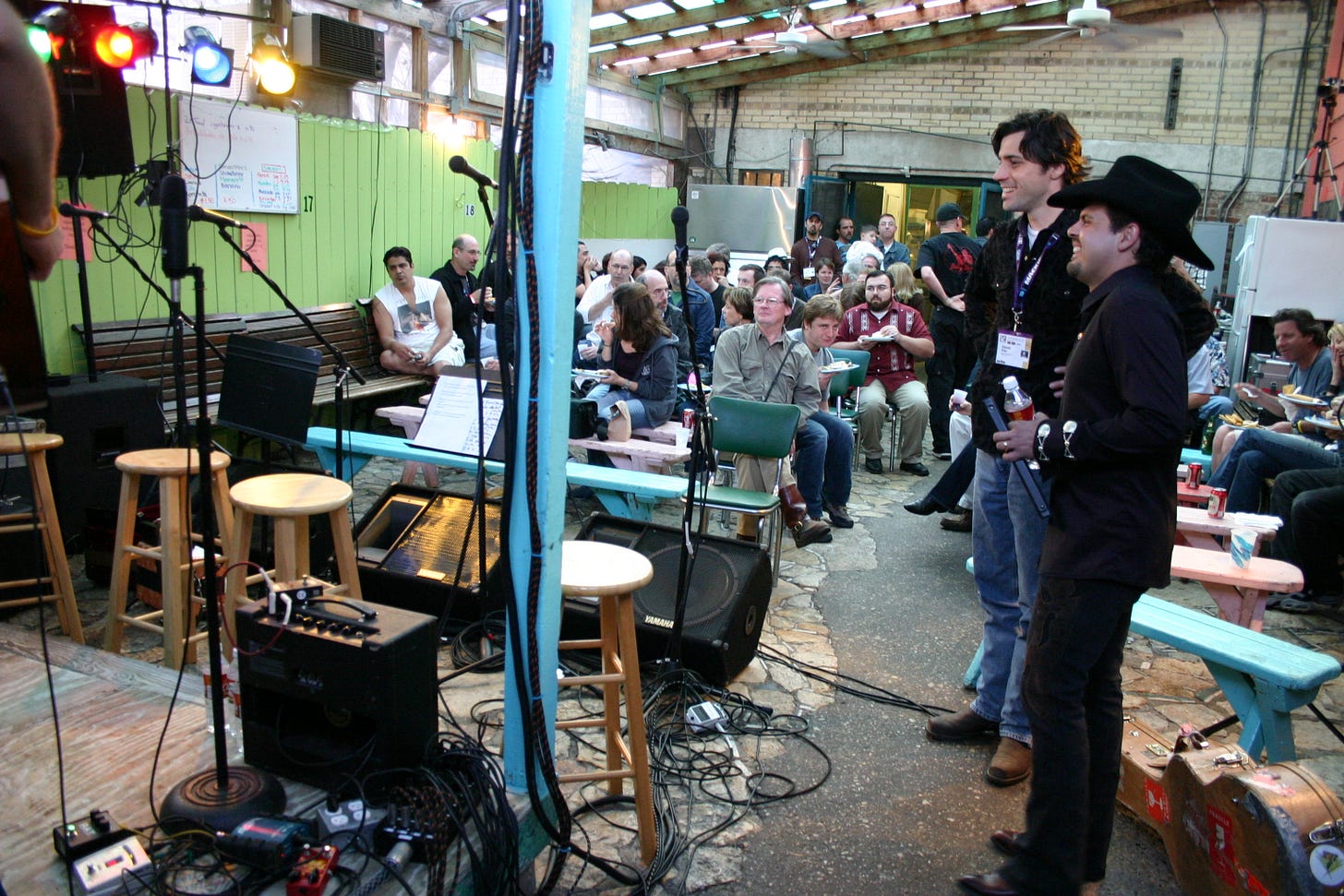

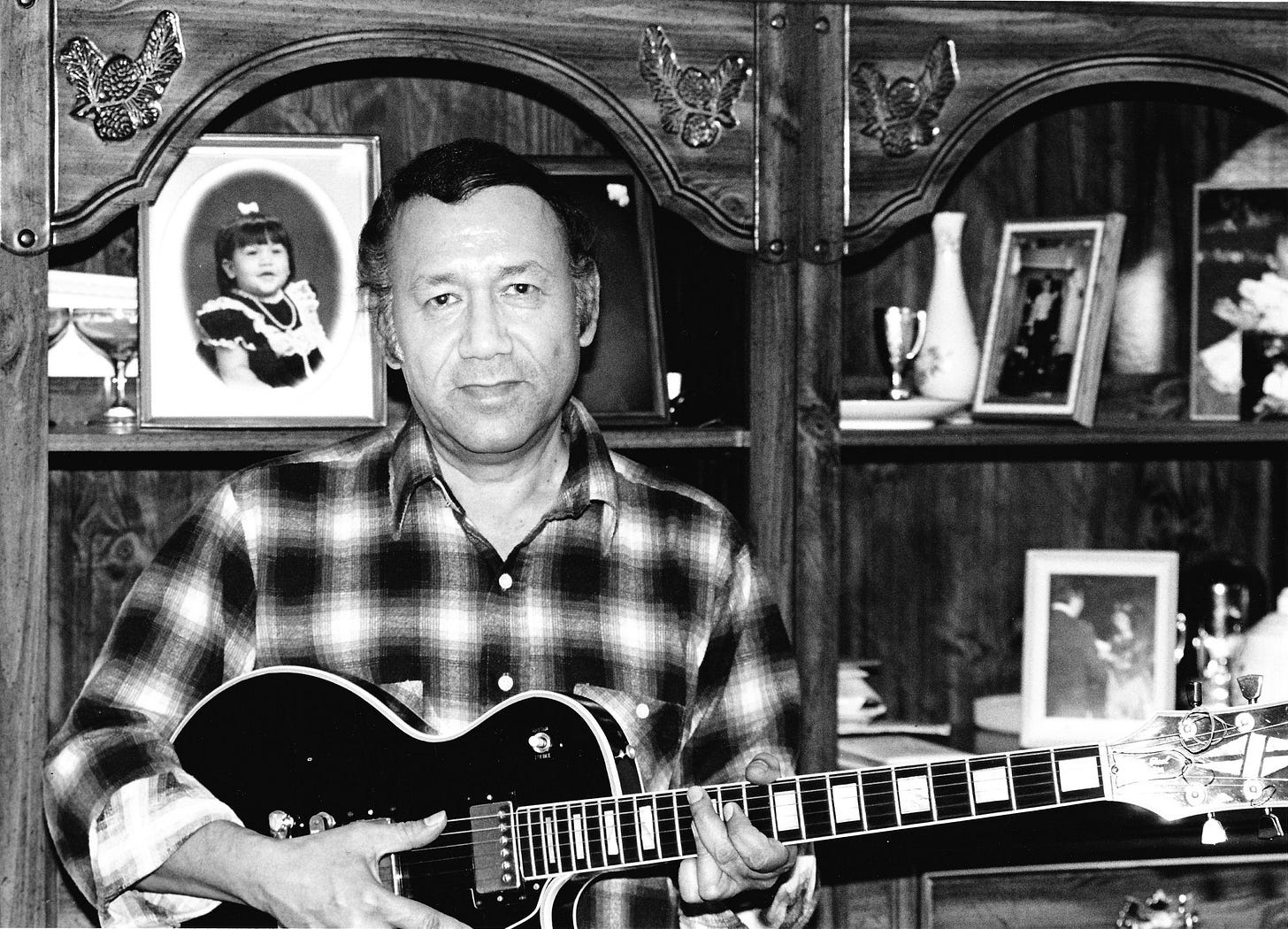
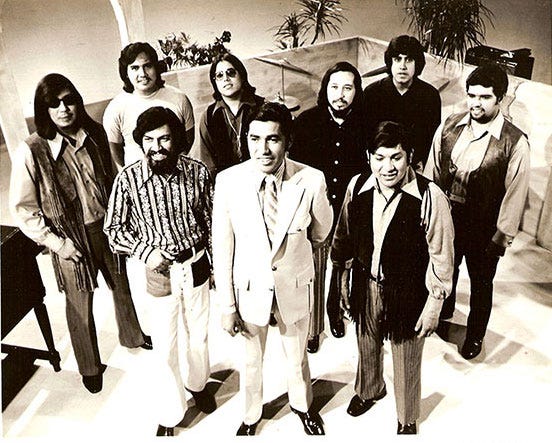
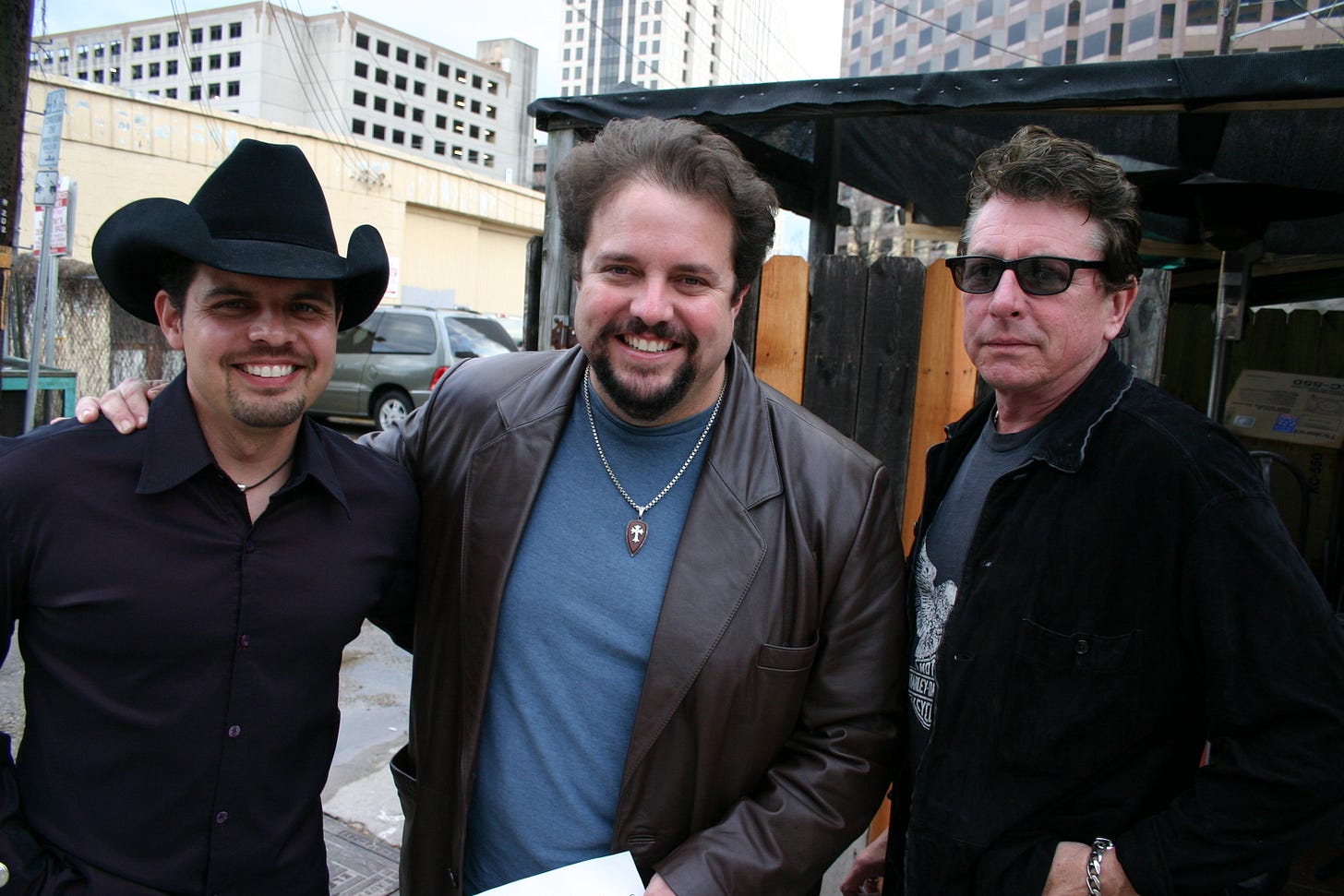
I met Ruben in 1978 at the depth of his popularity at Raul’s, where he was playing believe it or not. Roy had a weakness for that generation of Mexican bands, and sometimes it was sad to see former stars like Shorty and the Corvettes play to nobody. I would never have predicted that in a few decades he’d be playing Bass Concert Hall.
Always good Michael, How bout a story on Austin’s Valmon Records, both label and stores, think the Babycakes cut a 45 on Valmon, but most of their output was Chicano but not all !